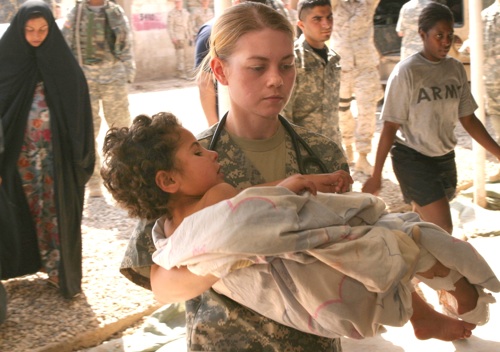
Photo Courtesy of U.S. Army
Peace is elusive. It is futile. And yet we are still responsible for seeking it, creating it, and not supporting anything that would hinder it.
This shouldn't upset us. The Christian life is full of paradox. We can be glad for them. They remind us that this life is complex enough to keep us from reaching any cut-and-dry, declarative conclusions on subjects that are not meant to be ours to control. Anything simpler would be a hobby.
This paradox gets juicier: Can we ever be truly at peace with any peace that we find?
The famous Micah 6:8 exhortation lists the three simple expectations placed on us:
- Act justly
- Love mercy
- Walk humbly with your God
What are the implications for peace? If you do those three, peace will be a byproduct. If you achieve peace, you will have realized those three as well.
So, that's easy enough, right?
Sort of. You know that Megadeth album? Peace Sells, But Who's Buying? It doesn't take a genius to figure out that achieving peace takes a lot more effort, ingenuity, genius, and work than managing war.
But that's not quite what we're discussing here.
Who needs peace? Victims of violent inequities: abuse, economics, genetics, guilt.
- The now-adult woman who was repeatedly brutalized as a child and remained silent because she assumed no one would believe her. She is plagued by nightmares and haunted by feelings of worthlessness, unable to be comfortable with any good thing because of the conviction that it will dissolve in an imminent instant. She needs us to reassure her, nobly, kindly, tenderly.
- The out-of-work husband and father who can't find hope in the midst of a rising horde of militant creditors. He needs us to hire him.
- The third-world family who needs to travel by foot two hours each way just to get enough nominally clean water to survive every day. When the water hole dries up, or becomes contaminated, they will die. They need us to build infrastructure in their community, and show them how to use and maintain it.
- The young urbanite who has concluded that the best course of action for safety and growth is to join a gang that will validate his involvement in something important, but only in exchange for his involvement in rape, theft, extortion, and murder. He needs us to show him security beyond violence.
- The manic-depressive who left her manic phase behind months ago and plans this week to be her last. She needs therapy and medication, and she needs us not to judge her for that.
- The junior high school student who is ridiculed and humiliated, on the verge of doing something drastic and final to himself or herself, or to others. They need those of us who have survived it to come alongside and remind that ridicule and humiliation are not the antithesis of self-worth (and, indeed, may actually be signs of jealousy).
- The veteran who wakes up screaming, overwhelmed by images of atrocities witnessed, or perpetrated by him. At the risk of great peril, is it our right to expect someone else to show him that his hands were made to do the work of something better than destruction?
Do you notice a connection here between peace and love? A life of peace will love others. A life not of peace will withhold love from others.
Peace happens on an individual basis, mano a mano. It's one of the few things we can give to someone else without losing it ourselves. Give it out liberally.
Now let's get to work.
This post is part of
Bridget Chumbley's One Word at a Time Blog Carnival.
Previous carnival entries have focused on lust, love, and church.
Bridget Chumbley's One Word at a Time Blog Carnival.
Previous carnival entries have focused on lust, love, and church.